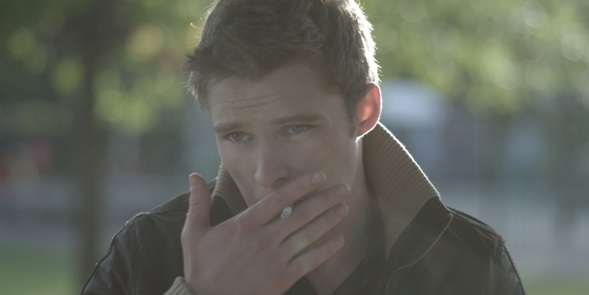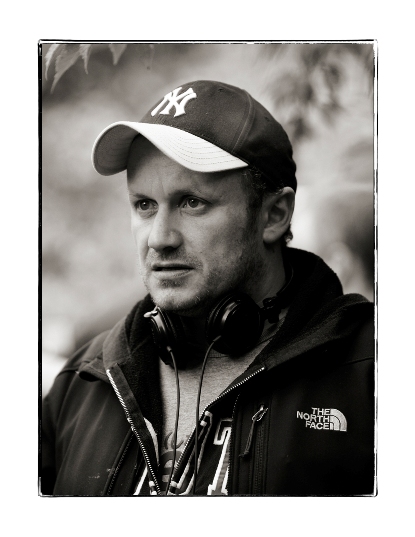What Richard Did, Irish director Lenny Abrahamson’s thoughtful and meditative new film draws inspiration from the notorious (and apparently purposeless) murder of a teenager by three contemporaries outside a Dublin nightclub in 2000. Important to emphasize inspiration, because rather than focusing on the whys and wherefores, What Richard Did instead uses the now-fictionalized event as the fulcrum to explore the moral and social values of an oft overlooked social milieu, the Irish middle classes.

The convincing authenticity of What Richard Did‘s mise-en-scene frames sharply observed but unforced portrayals of youth and privilege, especially in eponymous lead Jack Raynor. This might surprise somewhat, given Abrahamson’s track record – his previous films, 2004’s Adam & Paul and 2007’s Garage both focus on outsiders, heroin addicts and a lonely petrol station caretaker respectively. But as Abrahamson points out in an email conversation, the world of What Richard Did is familiar to him from his own years growing up in South Dublin.
Abrahamson grew up in Dublin, both parents Jewish migrants from Poland. After taking a first class degree in Physics and Philosophy at Trinity College Dublin, he briefly studied towards a PhD in Philosophy at Stanford, but packed it in after an early short made whilst at TCD, 3 Joes, won a major award at the 1991 Cork Film Festival.
Success didn’t come easily: five fallow years followed, before Abrahamson edged his way back into the fray, directing commercials for the better part of a decade before meeting screenwriter and early collaborator Mark O’Halloran, the writer of Adam & Paul and Garage.
What Richard Did cements the reputation of a director with a sharp eye for the non sequiturs of the modern life. He is currently filming Frank – about the decidedly enigmatic British pop “star” Frank Sidebottom – with Michael Fassbender and Maggie Gyllenhaal, and after that has been tapped to make a film based on the life of Franz Stangl, the commandant of Sobibor and Treblinka camps during the Holocaust.

Akin Ajayi: What Richard Did is inspired by – rather than a faithful adaptation of – Kevin Power’s Bad Day in Blackrock, which in turn was loosely based on the Brian Murphy manslaughter case of 2000. Book and film nonetheless share a common DNA in taking class and privilege as their starting point. What can your interpretation add to how the audience – Irish and elsewhere – engage with these tropes, or with their understanding of the Brian Murphy affair?
Lenny Abrahamson: We were very careful to completely break any specific connections to the Brian Murphy case that may still have existed in Kevin’s book, so, in any literal sense, the film adds nothing to our understanding of the events of 2000. In terms of ideas of class and privilege, it is certainly true that, given his elevated starting point, when Richard falls he has a particularly long way to go. It is also true that kids like Richard are trained to expect great things of themselves, and this creates an inability to deal with failure (and everyone must at some point face personal failure). For Richard, the small moral failures around his relationships with Lara and Conor lead directly to the catastrophe at the centre of the film. All that said, this is not a film about a particular class, it is not a social study. The gap between who Richard is and who he thinks he is, is a gap that exists for all of us.
AA: You’ve said elsewhere that the milieu represented in the film is by no means a new one (i.e. not a creation of the now-deceased Celtic Tiger). Still, I wonder whether the tone of the film might have differed if you had made it, say, 8 or 9 years ago. Might you have placed a different emphasis on how Richard manages the matter of guilt and responsibility, for instance?
LA: It is very hard for me to know. At a gut level, I think not. The film does not focus on any kind of material excess, and Richard is very much like many boys I knew growing up.
AA: Of the acting, I’m particularly struck by the naturalism that your young cast bring to their roles. Given that you would not be on their social and cultural wavelength (I presume!), how did you go about shaping and guiding the characters that ended up on screen?
LA: Actually, though different in many respects, my childhood took place within the same broad milieu. I went to a school like the one Richard went to and so I knew much about that world. But of course, that is a long time ago and things have changed. The way around this gap for me was to cast the film early, drawing actors from the right background, and to work, along with the writer, Malcolm Campbell, with them on and off for nearly a year. That is how we learnt their argot and the details of their lives – all of which went into the film through many rewrites.
AA: Richard’s father has a small but pivotal role in the film. We actually learn very little about him over the course of the film, aside from the fact that he is not Irish. This stood out for me, and I wondered what influenced this casting choice.
LA: There are many reasons why we cast Lars Mikkelsen to play Richard’s father. For one thing is a great actor. Also, I was keen to break out of cliched representations of the middle classes that tend to dominate films made in the UK and Ireland. There are no generic families and I know many families with a foreign parent. Lars also brings a melancholy depth to the character of the father which added greatly to the film.
AA: In many ways, Richard is a sympathetic character. He is thoughtful, mature, ambitious and likeable. All these qualities stand out against the end of the film, ambiguous in tone but clearly suggesting that Richard doesn’t do “the right thing.” Would it be an over-interpretation to suggest that this failure mirrors those of contemporary society writ large? Specifically, I am speculating about the transition from an Ireland that was shaped by communal, Catholic values (including that very peculiar Catholic sense of guilt) to one far more individualistic and self centered?
LA: I think it is true to say that there is an allegorical element playing in Richard. Ireland, through the boom time, became very self-satisfied. In the end it turned out that the reality was very different to the glossy self-perception. But that’s as far as it goes. I doubt whether, in reality, Ireland was ever truly shaped by communal, Catholic values!
AA: The film crafts a largely self-contained, intimate perspective of Richard’s world. I wonder whether you were able to draw inspiration for this from your experience of growing up as part of a minority group in Ireland.
LA: All of us are parts of various minorities – ultimately we are in a minority of one. Even when I was very young, I never fully identified with the minority I came from. I’m an atheist so my Jewishness is purely cultural. I have always been very critical of Israel politically, so was very much in a tiny minority within an unquestioningly loyal Dublin Jewish community. I socialized outside the community as well as within it through my teens. Richard, on the other hand, is a fully paid up member of his particular clan.
AA: Your next two projects – Frank, about Frank Sidebottom, and Into That Darkness, about Franz Stangl – seem very far apart in tone and content. I wonder what factors influence your choice of projects, and whether a common thread runs through them.
LA: There are threads. Frank is a chance to explore the slapstick that runs through Adam & Paul and, to a lesser extent, Garage. The Stangl project is another journey into a morally complex world, which, at our peril, we prefer to see as simple, black & white.
AA: What inspires you as a film-maker? Or to put it slightly differently, why do you make films? It’s certainly not the easiest of professions, and after your early success with 3 Joes, you went through a fallow period that might have deterred others…
LA: Making films is often very hard – and I can’t say I really enjoy it – but I feel compelled by and excited by the medium and aware that so far I have only scratched the surface of its expressive possibilities. Though the fallow times, I did come close to throwing it in, but somehow I could never do it. I am a dogged person, I value my insights and instincts and so I kept going.
Irish Film & Music week opens February 20th with Lenny Abrahamson’s film What Richard Did, Adam and Paul and Garage will also be shown at the festival. Read more about the festival, and find information on screening dates on this link.





